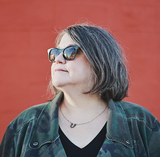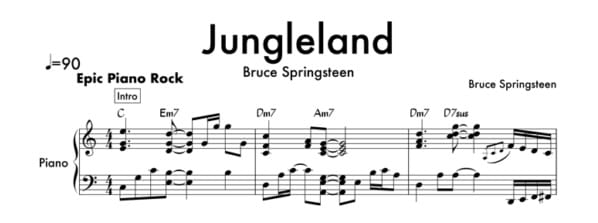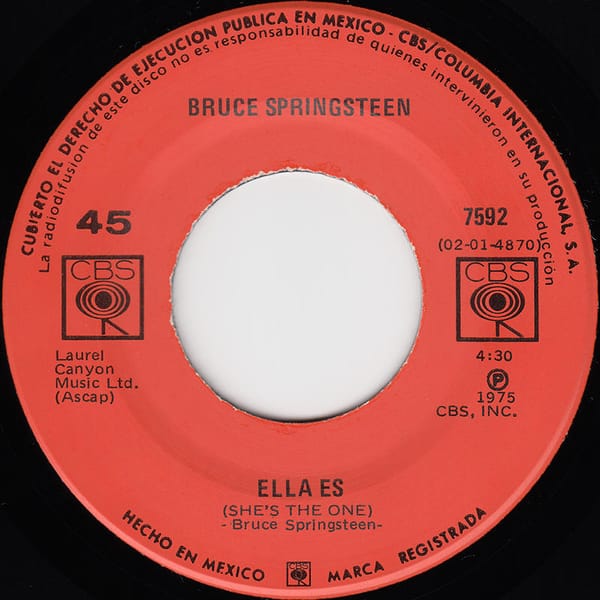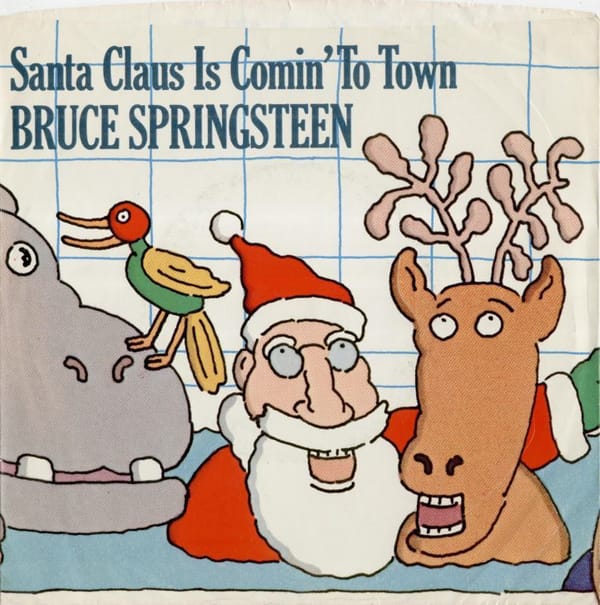Three Minute Record: "Mountain of Love"
"Standing on the mountain looking down on the city..."
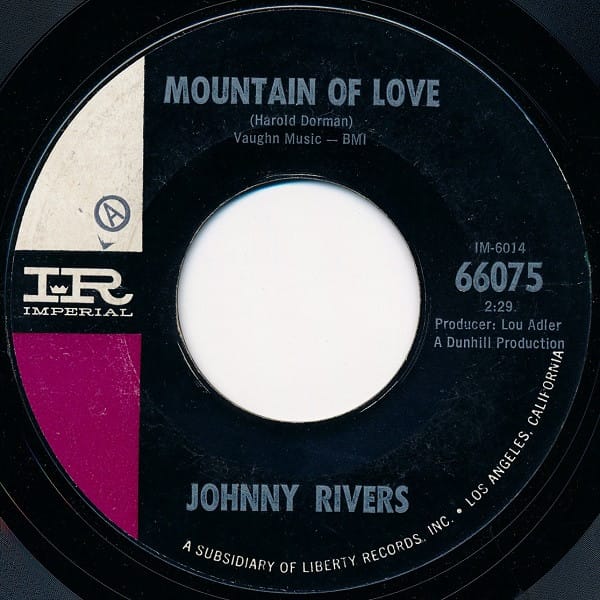
Welcome to Three Minute Record, the edition of this newsletter where we dive into Bruce Springsteen’s best cover versions. You can read more about the purpose of this exercise here and see other volumes here.
In this edition, we discuss "Mountain of Love," written by Harold Dorman and popularized by Johnny Rivers.
"As soon as we started doing these requests, people started getting very sassy. Very sassy. Trying to stump us with stuff we played 25, 30 years ago. The elephant never forgets! So tonight we'll challenge the band... and probably challenge most of the audience, too!" This is how Bruce Springsteen introduced the first performance of “Mountain of Love” in 33 years, live from what was known as the Scottrade Center in St. Louis, MO, at the second-to-last (or third, depending on who you ask*) show of the 2008 tour.
Official archive release: St. Louis 2008
That night I was on the second GA barrier behind the pit, and everyone in my immediate vicinity completely and utterly lost their fucking minds. (You can hear this on the recording. It's fantastic.) There was no one in the audience who thought they were going to hear that song tonight, or, actually, ever, except for whoever decided they were going to bring a sign for that particular E Street Band oldie -- and I’d bet that even that individual when pressed would probably confess that they were sure it was a long shot.
But it was a good night to take that shot, given that the band came on and opened with “Then (S)he Kissed Me,” E Street's gender-swapped cover of the Crystals’ 1963 hit. Most Springsteen fans know it from either bootlegs of the 1975 Bottom Line shows or from various compilations over the years that focused on the early rock and roll covers that would show up in the early-to-mid 70s era of E Street. “Then (S)he Kissed Me” was on the written setlist and had been soundchecked before the St. Louis show probably courtesy of signage in Nashville two nights/one show earlier.
[That was one of the dangers of the sign request era, that if you had a good sign that Bruce knew would need a little rehearsal first, he’d take the sign and the song would show up a show or two later, and you’d be sitting at home watching the setlist roll in on BTX or Twitter (no? just me?) and shake your head in disgust that you’d missed it. (Not that Nashville in 2008 was anything to be disappointed in!)]
“Mountain of Love” was not on the written setlist for St. Louis, nor was it soundchecked, but to my ear at the time, it definitely felt like it had some preparation. It’s fun to hear Bruce coach the band through it ("Once more! Half time!”), and be sure to listen to Roy Bittan’s flourishes. I’m sorry that either Clarence didn’t have the baritone sax or that he didn’t play it because he was having mobility issues – this was the tour with the elevator and the illuminated throne, after all – or I just can’t hear it in the mix. But none of it mattered because after decades of listening to that song and wishing we were there when it was performed, now we all were.
Welcome! You're reading a free post here at Radio Nowhere. Take a look around and consider becoming a subscriber and supporting this work. Click here to learn more about what this project.
It felt like the entire arena was levitating six inches off the ground that night, not just because it was a song that no one thought they’d ever hear and hadn’t been played in three decades, but because the E Street Band performs an absolutely righteous version of the song, and that night in St. Louis, they absolutely lived up to that reputation.
“Mountain of Love” was originally written and performed by a true one-hit wonder by the name of Harold Dorman. If you haven’t heard of him, it’s not because you haven’t done your homework, it’s because he isn’t well-known and because in this instance he wrote a song that ended up being made famous by someone exponentially bigger and brighter: Johnny Rivers.
Rivers was a 60's-era pop star who you probably know because he’s the guy who sang “Secret Agent Man” (among other hits). He specialized in a stripped-down presentation of classic rock and roll, close to rockabilly and not far from the aesthetic Elvis himself would explore around the time of his ‘68 Comeback Special. Rivers recorded a fantastic version of “Mountain of Love” in 1964 with the Wrecking Crew as his backing band. His version went to #9 on the Billboard Hot 100 that year.
It's rare to hear/read anyone writing about “Mountain of Love” in the context of Bruce Springsteen to mention Johnny Rivers. While it is factually correct that Dorman wrote the song, his record didn't become a hit, and I'll argue it wasn't the version that the E Street Band based their arrangement on.
Harold Dorman was originally signed to Sun Records, but wasn’t successful there. He moved to a label named Rita Records, started by some ex-Sun musicians, and that’s when he wrote and recorded the original version of “Mountain of Love.” The song began to gain a little bit of traction and so the label went back into the studio and added strings to it. That was a reflection of listener tastes at the time, where strings indicated “class,” at least according to Sam Phillips’ brother Jud, who worked for a promotion company hired by Rita Records. It did seem to help, and the song went to #21 on the Billboard charts in 1960.
Now let’s talk about Johnny Rivers. Johnny Rivers’ history is fascinating because his stardom was completely accidental. He’d been around the industry since the late 50’s, playing basic, meat-and-potatoes rock and roll and coming close to breaking out but hadn’t been able to make it happen. He’d moved to LA at the start of the 60s with a mind towards moving into record production, sure that he’d missed his chance of success as a performer. In LA, he’d frequent an establishment called Gazzari’s (which will be familiar to later generations of Sunset Strip music fans) which had Italian food and a little jazz combo.
One night, the owner of Gazzari’s came to Rivers, distraught that he’d lost his jazz act and asked him if he could put something together for a couple of nights until he could find another jazz group. Rivers recruited a drummer friend, and so it was the two of them, guitar and drums, doing minimalist 50s rock and roll, and this time, Rivers’ timing was right. What was a one-night favor turned into a nightly engagement that was always packed. He’d soon hook up with impresario Lou Adler and begin a residency at a new club called the Whiskey a Go Go, packing the room night after night. His career took off from there, with a memorable live album, and multiple chart hits. He was still performing live in his late 60's. At the age of 82, Rivers is still with us, but he no longer performs.

I believe that the E Street Band cover of “Mountain of Love” has its roots firmly in the Johnny Rivers camp for several reasons, but the most immediate one is right there in the grooves. Listen to Johnny Rivers’ “Mountain of Love” compared to either of Harold Dorman’s efforts and it seems pretty obvious to me, but the other factor has to do with the timing of the releases and where Springsteen was in his music fandom. He’s stated repeatedly that post-Elvis, he wasn’t paying close attention until the British Invasion came along. He was 10 when the original version came out but was a music-obsessed teenager in 1964, soon to be working in bands that had to know the popular songs of the day. Johnny Rivers’ version of “Mountain of Love” fits that description.
Bruce has also, in later years, talked about the wide influence of oldies radio on him, specifically New York City’s WCBS 101. WCBS switched to an oldies format in 1972, focusing on songs released in the 1955-1964 time frame. That’s where I first heard Johnny Rivers and where I first heard “Mountain of Love.” They also had a fantastic doo-wop show on Sunday nights that was singlehandedly responsible for my early education on the subject, because a suburban teenager in the 70s didn't have a lot of other access to this music. “Mountain of Love” entered the E Street repertoire with the Main Point show in February of 1975, its first documented appearance. I think the inference is reasonable.
The likely reason the Dorman attribution circulates and no one talks about Johnny Rivers is because Dave Marsh specifically mentions it in Born to Run. “He [Springsteen] also had a memory for every honest moment ever put on wax, it sometimes seemed, whether it was Gene Pitney’s ‘Love My Life Away’ or Harold Dorman’s ‘Mountain of Love’.” But that statement in my opinion says more about Marsh’s vast mental musical library than any kind of confirmation that Dorman’s 1959 release is the genesis for the E Street cover.
[Also: this is the first time I've seen a reference that Bruce ever covered "Love My Life Away" and it's not listed in Brucebase, so maybe we need to track that down.]
Dave Marsh was a huge fan of the original “Mountain of Love.” He ranked it at 494 in his 1989 book The Heart of Rock & Soul [bookshop | amazon], a "guide to the 1,001 greatest rock and soul singles ever made…these are not necessarily the best-selling singles ever released, these are the ones that made a difference.” Reading the entry for this song now, where Marsh digs into its history – Dorman was inspired to write the song by a hill near his hometown in Mississippi – but I still can’t appreciate it at the same level that Marsh does, but I think that’s because I never heard it until after both Johnny Rivers and the E Street Band’s versions had already etched grooves in my brain. I can't hear what he hears.
And while I don’t disagree with Marsh’s assessment of Bruce’s musical taste, I also know that unlike, say, Southside Johnny and Garry Tallent, he wasn’t a diehard record collector. Could one of those people have brought the single to Bruce’s attention? Absolutely. But absent someone asking him specifically about how the song entered his mind (and him remembering all these years later) we are still offering theories, but trying to offer them based on knowledge, information and understanding.
The Johnny Rivers version of “Mountain of Love” is cleaner than the original; it swings in a more sophisticated way than the original; the instrumental arrangement is perfectly aligned with the way the E Street Band sounds/sounded – the Wrecking Crew weren't the Wall of Sound but they were definitely a house in the same zip code.
Journalist Clinton Heylin, in his book about the E Street Band (E Street Shuffle: the Glory Days of Bruce Springsteen & the E Street Band [bookshop | amazon]) weighed in with this statement: “He even mastered elements of rockabilly and doo-wop well enough to debut an E Street version of Johnny Rivers’ ‘Mountain of Love’ that spanned both styles.”
I think the attribution for "Mountain of Love" in regards to the E Street Band should be “written by Harold Dorman but popularized by Johnny Rivers,” which is why I didn't include an artist name in the headline of this piece. That statement provides a reader with information and context and a signpost. If you hear the E Street version and want to know more, by all means, go and dig into both of them. But just saying ‘Harold Dorman' in my opinion is leaving out essential pieces of the story behind this song.
“Mountain of Love” became renown in Springsteen fandom because of the 2/5/75 Main Point broadcast, when it went out into radioland and then became immortalized to us forever on tape. (It was also a popular track on various compilations of Springsteen cover versions for decades.) The Main Point was also the first documented time the song had been part of the band’s repertoire. It stuck around for the next night’s show at Widener University, popped up again a week or so later at Penn State, and then was featured in the 12/30 and 12/31 shows at the Tower Theater. It went AWOL after that, only to reappear in 1979 at a private party for Clarence Clemons’ birthday (mentioning that for the completists out there) before surprising the bejeezus out of us all in St. Louis in 2008.
There’s been a handful of other appearances since then, the most recent a semi-acoustic version in the encore on 5/3/13 in Stockholm. I reviewed the Stockholm show for brucespringsteen.net and had this to say about this particular rendition:
Bruce collected several sign requests from the audience in the course of the evening, but only one would make an appearance later in the encore: the rare early cover "Mountain Of Love": "This is a song the band used to play, going back to the early 70's - Michelle Moore was not even born yet!" However, tonight, instead of bringing on the full band, Bruce elected to prefer the song solo on acoustic guitar, substituting a whistling solo in place of the song's usual piano one.
We opened this essay with Bruce's own words, so let's close with a quote from a mid-70s interview on this topic: “We don’t play no oldies. They may be older songs, but they’re not nostalgic, really. I was never into that whole nostalgic thing, because it's stupid. But these songs are different. It's obvious by the reaction they get. It's great tody, it's great right now, and if somebody plays it and people hear it, they'll still love it tomorrow.”
Official archive release: St. Louis 2008
Note: the quote in the last paragraph was butchered from the original in the source I used and I have updated it to the original (from Marsh, Born to Run, p. 75)
*The last performance of the E Street Band in 2008 was at the private Harley Davidson Festival in Milwaukee, but the band regarded Kansas City (the night after St. Louis) as the last show and behaved accordingly.

